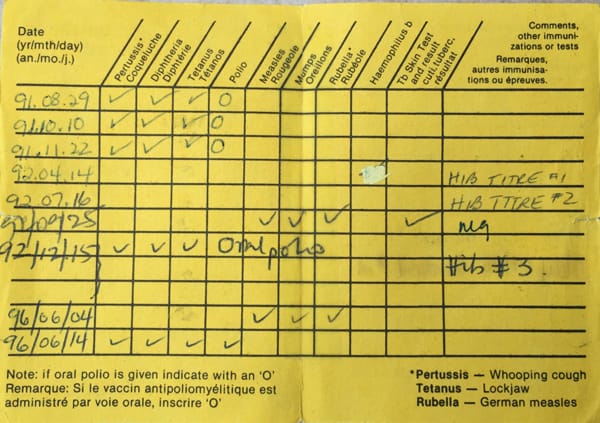My son emailed me this week to ask if he had been immunized for measles when he was little. He’s working for a Silicon Valley tech company for a co-op work term. His employer had issued a notice that an employee in another building has contracted measles, so he wondered if he is at risk.
His concern is valid given that a lot of kids at Silicon Valley daycare centres run by big tech companies have lower rates of vaccination than the state average, and a measles outbreak at Disneyland in California has spread to a string of outbreaks in the U.S. and Canada.
Digging out his immunization record, I could see that he’d had the first MMR (measles mumps rubella) vaccine shortly after his first birthday and a second shot when he was 6 years old.
This wasn’t the first time I needed to look back at a paper health record for my kids, though.
My daughter had a similar question years earlier. She had applied for a volunteer position at a hospital in her university town and needed a signed letter from our family doctor to verify that her immunizations were up to date. But he was unable to find her records in the clinic’s mess of paper files and said he would provide a letter if she could come back with records from MY files.
I still have both kids’ little yellow leaflets. Our first family doctor had filled out the information in the early days, but later doctors just told me to enter the information myself and not lose them.
Our family doctor belongs to a clinic where the owners of the practice are dragging their heels to convert to electronic health records. According to eHealth Ontario’s Progress Report, 2 out of 3 Ontarians are covered by electronic medical record (EMR) software and 7 out of 10 physicians use EMR software in their practice. Just not our family doctor yet.
The College of Physicians and Surgeons of Ontario has an extensive policy in place for medical records. It’s disappointing that the record keeping is so sloppy at my family doctor’s clinic. However, I am surprised to learn that the responsibility to keep a personal record of immunizations rests with individuals.
I agree with taking responsibility for personal health, but I’m surprised to learn that vaccines and ultimately herd immunity against infectious diseases depend on the honour system. I never would, but in theory, I could have falsified my daughter’s information with no checks in the system to verify. Patients at that hospital might have been at risk if she was not really up to date. Given our experience with immunization records, any prediction of vaccination rates in specific geographic areas is a guess.
In Canada, we have no national vaccine registry. A large project called Panorama, envisaged more than five years ago to track things like immunization coverage, disease outbreaks and vaccine supplies, has been stalled by setbacks and adopted on a piecemeal basis—some provinces are adopting parts and others have declined participating altogether.
I hope that someday, immunizations will be part of our digital health records for two reasons—easier access and accuracy. In the meantime, I’m glad my family is up to date.



If you are unsure about vaccines or immunity, you can have a simple blood test to check the titers. I had to have that done as a new employee when I worked in hospitals as a nurse. It is very simple and plus vaccines do wear off. So if you’re worried about immunity, that’s the way to go.
Thanks, Roxanne. That’s a good point, especially if it’s been a while since someone has had a vaccine. Unless I specifically requested that though, I don’t think my doctor would think of it. So much is lost in the paper shuffle and fast appointments.
I’m thinking my kids should have a complete review of their immunization status at their next checkup (and take over the paper records themselves…).